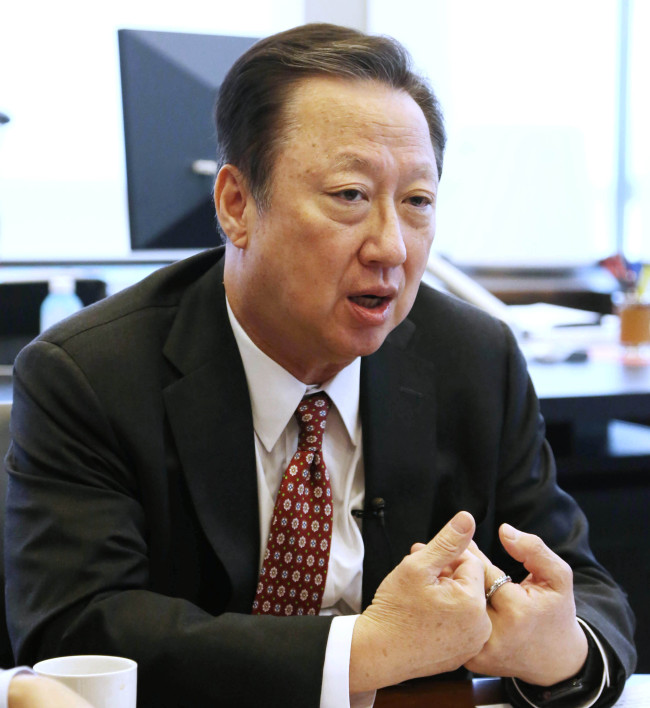The clock is ticking for full-fledged reforms in regulations for Korean businesses to survive, the head of the country’s top business lobby group said Wednesday, voicing concerns over an economic recession and companies losing growth momentum due to multilayered market restrictions.
Comparing companies to “frogs in a burning pot,” KCCI Chairman Park Yong-maan stressed that there is not much time for companies in the face of fierce market competition, adding that damage is already being seen.
The longtime advocate of regulatory reform urged the government and political circle to find ways for them to “jump out of the pot” by pushing ahead with radical deregulation.
“The government has pledged (deregulation) in words but has not taken any action. Even if the president expresses his will to push for regulatory reform, civil servants are (stuck) in (an old) system in which they cannot come forward,” he said in an interview with reporters on Monday.
“They fear that things are going to be chaotic if regulations are lifted … They don’t come forward because they worry about disadvantages they would face every time there’s a change in power,” he said.
In light of the age-old regulatory system, it is “impossible” for businesses to seek ways to revitalize the economy and create new jobs, he said, urging the government to adopt a “holistic approach” instead of solving problems in “bits and pieces.”
Under political pressure, South Korean administrations have often striven to save companies from collapsing by providing financial assistance, he said. Its massive investments into already-collapsing companies have in turn resulted in neglecting those that are trying to develop new technologies, he said, citing how Germany allocates 92 percent of its financial assistance to companies for R&D while Korea spends only 26 percent.
 |
KCCI Chairman Park Yong-maan speaks at an interview with reporters on Monday in Seoul.(KCCI) |
Park also criticized the government’s pressure for the flexible job market of an advanced economy despite the country’s social safety net level remaining the lowest among Organization for Economic Cooperation and Development countries. Asia’s fourth-largest economy ranks 34th out of 35 OECD countries in terms of social safety net strength.
The job market can only be flexible when workers have a solid safety net supporting them and their families while they look for new jobs, he said.
Regarding the clash between businesses and labor over the government’s revision of the minimum wage and work-hour system, Park said he, as the head of the KCCI, is not against it and believes it is a rather rational choice. However, to make it happen smoothly, the government should create an ecosystem in which companies can grow, he said.
“But there should also be a way for innovative companies to grow and create new jobs, but they cannot. Why? Because regulations are blocking them and also because the government is supporting companies that have already reached their limits but having them continue their operations.”
Economic growth, in numbers, has improved this year, but not in terms of quality. Park remained skeptical about a recovery next year unless fundamental reform changes are implemented, citing persisting downside risks of the global economy and contraction in consumer spending.
“(The South Korean economy) has grown across-the-board with its overseas shipments and the trade volume surpassing $600 billion and $1 trillion, respectively, for the second consecutive year, and the income per capital also breaking the $30,000 mark,” he said.
“Profits by businesses also grew but we are still heavily dependent on performance of the chip sector. The progress in innovative business was slow,” he said, also mentioning the weak job market and downgrades in economic growth forecasts for next year.
Asked about the prospect of inter-Korean businesses, he said that souring relations between Seoul and Pyongyang would be detrimental to the South Korean economy.
But the scenario of South Korean companies taking advantageous positions in the market is unlikely, he said, stressing that North Korea’s open market policy is somewhat different from that of Vietnam. Pyongyang would hold the control for the change, not leaving changes to occur under free market principles.
To create a market, a country needs infrastructure, which requires investments. But with North Korea lacking any form of economic transparency required to receive international assistance, such as from the International Bank for Reconstruction and Development, the game changers for North Korea would be individuals with greater funds, Park explained.
Citing China’s aggressive investments into the African region as a similar case, the KCCI chief remained skeptical of the extent of the role that the Seoul government could play in such competition.
By Cho Chung-un (
christory@heraldcorp.com)








